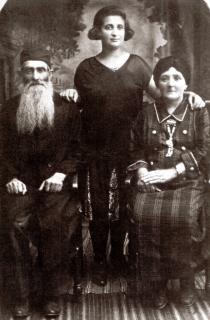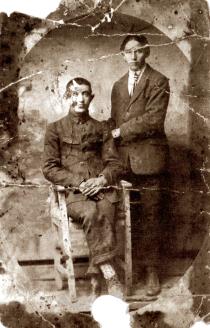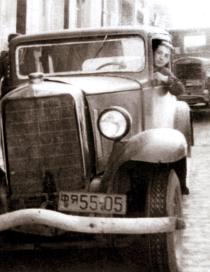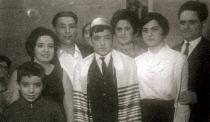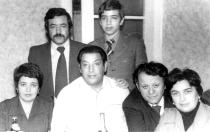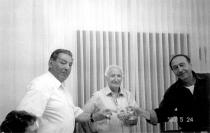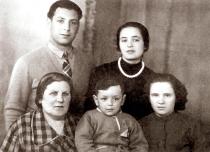
Leonid Krais
Ukraine
Kiev
Interviewer: Ella Levitskaya
Date of interview: November 2002
I met Leonid Krais in his office. He said that he has been spending most of his time in the office since his wife died. Leonid Krais owns a transportation agency and a tourist bureau. His older son is a co-owner of the agency. Before our meeting, Krais showed me around his agency. He is a good master of his company. There are fruit trees and a summer shed in the yard. There is also a well with very good water. Krais is a short and vivid man. He is lame, but quick in his movements. His employees call him Mr. Lyonia [affectionate for Leonid]. He takes good care of his employees and is very proud of his company. During our interview he often recalled his stay in the ghetto. One can feel that the horrors of this time have been imprinted on his memory.
Family background
Growing up
During the War
After the War
Glossary
My grandparents on my father's side, Leizer and Khone Krais, came from the town of Lipkany. Lipkany was part of Romania before 1940, and now it's in Moldova. Lipkany was a small provincial town, very cozy and picturesque. Jews constituted the majority of its population and lived in the central part of the town. Richer Jewish families resided in very beautiful houses. There were about ten synagogues in Lipkany. The members of each synagogue united in guilds: there was a synagogue for tailors, shoemakers and cabmen, etc. These synagogues were located in neighborhoods inhabited by craftsmen in the outskirts of town. Richer Jews didn't mix with poorer Jews in the synagogues. They had big synagogues in the center of town. During the war the town, including almost all synagogues, was burnt down by the Germans.
Most of the Jews in Lipkany were craftsmen: tailors, barbers, shoemakers, carpenters, furniture manufacturers, cabmen, roofers, tinsmiths, blacksmiths that had their own forges, and so on. Jews were very good at their professions. It was customary for a son to follow into his father's footsteps. A boy began to learn his father's profession when he was small. These were family businesses that were transferred from one generation to another. Richer Jews were doctors and lawyers. Almost all stores in town were owned by Jews. However, there weren't that many really rich Jews. Most of them were just wealthy.
My grandfather, Leizer Krais, was born in Lipkany in the 1870s. He died in 1930. All I know about him is what my grandmother Khone and my father told me. He was a tailor like his father and grandfather. He had a shop in the center of town, in the same building where his family lived. He had a few employees, (seamstresses).
My grandmother was also born in Lipkany in the 1870s. I have no information about her family or childhood. My grandmother didn't like to talk about herself. All I know is that, after their wedding, my grandfather took my grandmother to the house that he had bought for his future family. My father lived in his parents' house until he got married. It was a beautiful one-storied brick house with a beautiful façade and a balcony in the center of town. I can't remember the exact number of rooms in the house, but I believe there were at least four rooms. The house burnt down during the war. Only the foundation was left. There's a restaurant in Lipkany now where my grandparents' house used to be.
My grandmother was a housewife. My grandfather was the bread-winner. They weren't rich. My grandmother used to say, 'How can one expect a tailor to make a lot of money with such a small needle?'. My grandfather had to work many hours. He could provide well for the family. They didn't have housemaids - my grandmother did all the housework. My grandparents had three children. My father Avrum was the oldest. He was born in 1902. The next son was Yankel, born in 1904, and their daughter Rivka was born in 1906.
My grandmother Khone was a very beautiful woman. Even when she got old she was still beautiful and stately. My grandmother wore long dark skirts and long-sleeved blouses with high collars, which was the custom among religious women of Jewish families. On Saturdays and holidays my grandmother went to the synagogue wearing a beautiful black silk gown and a shawl.
Their family was religious, of course. At that time it was the only way of life for Jewish families. Every Jewish family celebrated Sabbath and Jewish holidays. My grandmother followed the kashrut strictly. My father Avrum and his brother Yankel finished cheder. They studied the Talmud and the Torah and also Hebrew and general subjects such as mathematics, literature and history. There was anti-Semitism in Romania making the admission to secondary schools difficult for Jewish children, and the cheder provided secondary education to them. The cheder was a Jewish school for the advanced study of religion. Girls didn't attend cheder. My aunt Rivka was educated at home. She had a teacher from cheder teaching her all subjects. They spoke Yiddish in my grandparents' family. All members of the family had a good knowledge of Romanian, which was the national language [of the country at the time].
My father and his brother didn't really want to become tailors. My grandfather didn't mind and let them make their own choice in life. My father became an apprentice to a mechanic at the mill, and Yankel became an apprentice to a locksmith. My father later continued to work as mechanic at the mill. There was a lot of equipment at the mill, and he was responsible for its maintenance. He liked his work. Yankel opened a locksmith shop. I remember his lathe, which was pedal-driven.
My mother's parents came from a small town called Khotin in Romania, which formerly belonged to Russia. It joined Romania in 1918. There was a Jewish, Moldavian and Russian population in Khotin. People spoke Romanian, Yiddish and Russian. I have few memories of Khotin. I visited it when I was a child. The main historical place in town was an ancient fortress. The town was built around it. The majority of the population was Jewish. They were mainly craftsmen. There were several synagogues in town. I remember two of them. I believe, there were more, but I don't know for sure.
My grandfather, Moshe-Wolf Shatchen, was born in Khotin in the 1870s. He died of some disease in the 1920s. He owned a bakery and had two employees. My grandmother Beile was the same age as my grandfather. I don't know where she was born. My grandparents had four children. Yankel, born in 1901, was the oldest. Their oldest daughter, Esther, was born in 1903, my mother, Sosia, in 1905 and her younger sister Priva in 1907. They lived in a brick house, with three rooms and a kitchen, in the center of Khotin. It was furnished with pieces of dark wooden furniture: wardrobes, cupboards, sofas and chairs. I remember many pillows on the beds. Jewish families used to buy live poultry and used the feathers to stuff pillows and mattresses. They made a mandatory dowry for their daughters. Mothers were preparing dowry for their daughters as soon as they were born. We also had pillows and blankets that my mother had received from her parents.
The bakery was in the yard. When my grandfather died, my grandmother became the bread-winner of the family. She took up his business although she could have sold the bakery. But she had to take care of the children and took to baking. Her children helped her. My mother and her sisters baked bread, rolls and buns, pies with various stuffing, honey cakes and bagels. My grandmother's pastries were especially popular before the Purim holidays, when Jewish families were sending presents to their neighbors and friends. People used to take trays with pies, sweets and apples from house to house. My grandmother and her children had to work hard, but they managed well.
I knew my grandmother well and loved her. She was a very nice, kind and caring woman. She always wore a white apron over her long skirt and a shawl. My grandmother wore white kerchiefs at home and put on a dark shawl when she went out. People called her 'Beile der beker' - Beile, the Baker [in Yiddish].
My grandmother was a religious woman and also raised her children that way. They observed all Jewish traditions. My mother told me that they always celebrated Sabbath and Jewish holidays. On Pesach my grandmother hired employees so that she could spent her time with the children. She cooked traditional food and brought down special fancy tableware from the attic. My mother learned how to cook traditional food from her mother. The family went to the synagogue on holidays. They didn't go to the synagogue on Saturdays but preayed at home instead. On Friday mornings my grandmother cooked for Saturdays. In the evening she lit candles, and the family sat together for dinner after the prayer. On Saturdays the bakery was closed.
They spoke Yiddish at home, and Moldavian and Russian with their neighbors. My mother's older brother, Yankel, studied at cheder. All three sisters were educated at home. My grandmother was prepared to spend all she had in order to give her children an education. Yankel went to work for a landlord after finishing cheder. He was very fond of horses and worked in stables all his life. He married a Jewish girl from Khotin and lived with his family. He purchased stables with horses and a plot of land and became a successful farmer.
My parents got married around 1929. There were shadkhanim, professional matchmakers, that had lists of young men and girls, and parents often asked them for help when they wanted their son or daughter to get married. My parents were introduced to one another by matchmakers. They had a traditional Jewish wedding, of course. My mother moved to her husband in Lipkany after they got married. They rented a dwelling.
I was born in 1932. My parents named me Leizer, after my father's father. I was their only child. My mother became a housewife after I was born. My father was a mechanic at the mill in Lipkany. My parents weren't well off. My mother went to work when I was old enough to go to cheder. She made bags for a storage facility owner. She worked at home. She didn't earn much, but it was still a good contribution to the family budget.
The Jews of Lipkany always supported each other. Although we were far from rich, my mother tried to help the poor. It was a common thing to help less fortunate people. Our neighbors were very poor. When my mother cooked gefilte fish, goose or chicken on Saturdays or at Pesach, she always brought a bit of food over to them.
My parents were religious. My mother followed the kashrut strictly. We only had kosher food. Jewish storeowners only sold kosher meat. They didn't sell pork - although it was in demand with Moldavians - because Jews wouldn't buy meat that was lying next to pork. Jews bought live poultry to take it to a shochet and have it slaughtered. My mother kept meat and dairy products in different places. My mother baked bread and challah for Saturdays. She made bread once a week. The loaves of bread were kept in the cupboard and covered with a white cotton cloth. It didn't get stale for a week and was really delicious.
On Saturdays and on holidays my parents went to the synagogue. At Yom Kippur the family fasted. Only after the prayer at the synagogue we returned home and sat down to festive dinner. I've fasted since I was 5. On Friday evenings my mother lit candles and said a prayer, and father blessed the food. On Saturdays no work was done at home. My mother did the cooking on Fridays. She made meat stew and chicken broth that she left in the stove in ceramic pots to keep it warm. A Moldavian neighbor came to us on Saturday nights to light the lamps. A single Jewish woman living in our neighborhood had a big stove stoked with wood. A big boiler was built into it. She kept the stove and boiler very clean. On Saturdays a local came to her to fill the boiler with water, and light the fire in the stove. The neighbors' children came to her to have kettles filled with boiling water. She filled their kettles herself. We always had hot water for tea on Saturdays. She didn't charge people for boiling water on Sabbath. During the week people paid her for this service. She made her living that way.
On Yom Kippur the family fasted. I've fasted since I was 5. After the prayer in the synagogue [when Yom Kippur was over] we came home and sat down for a festive dinner. I remember Pesach at home. We bought enough matzah to last for a whole week. My mother also bought matzah for the poor family that she supported. We brought fancy dishes from the attic. My mother cooked gefilte fish, chicken, matzah and potato pudding. Even the poorest families bought new clothes for their children at Pesach. I don't remember whether my mother and father did the shopping themselves, but I always got something new at Pesach. My father conducted the seder ceremony on the first evening of Pesach. I asked my father the [four] questions in Hebrew that I learned by heart before I began to study Hebrew in the cheder.
On Saturday no work was done at home. My mother did the cooking on Friday. She made meat stew and chicken broth that she left in the stove in ceramic pots to keep the food warm. A Moldavian neighbor came to us on Saturday night to light the lamps. A single Jewish woman living in our neighborhood had a big stove stoked with wood. A big boiler was built in it. She kept the stove and boiler very clean. On Saturday a local came to her to fill the boiler with water and start fire in the stove. Neighbors' children came to her to get boiling water into their kettles. This farmer filled their kettles himself. We always had hot water for tea on Saturday. She didn't charge people for boiling water at Shabbat. During a week people paid her for this service. She made her living in this way. On holidays we often visited my grandmother Khone. She liked to have the whole family get together at the table. My father's brother Yankel and his sister Rivka also lived in Lipkany. They came with their families. Yankel had two sons, and Rivka had a son and a daughter. My grandmother loved her grandchildren. She cooked something special for us and gave us gifts. At Chanukkah our grandmother always gave us Chanukkah gelt. My grandmother didn't have a kitchen maid. She made all the food herself. I can still remember my grandmother's strudels with nuts, raisins and jam. Once a year we visited my grandmother in Khotin and I enjoyed these trips. I liked visiting her. I don't remember any other holidays at home.
In 1939 my grandmother Khone died. She was buried in the Jewish cemetery in Lipkany, according to Jewish tradition. Her grave is beside my grandfather Leizer's grave.
I went to cheder when I was 6. I enjoyed studying. I already knew the prayers before I went to cheder. My mother had taught me. At cheder I learned to read and write in Yiddish and Hebrew. I was fond of mathematicmathematics and history.
In 1940 the Red Army entered our town declaring it a part of the Soviet Union. Many Romanians escaped to Romania and left all their belongings behind. The Soviet authorities didn't touch our family because we weren't rich. All rich people were arrested and sent to Siberia. Some of them were even executed. The slogan of the Soviet power was: 'A Nobody should become a Somebody'. Those people in Lipkany that hadn't worked hard or made any efforts in their life reported on their rich fellow citizens and received their belongings from the new authorities for their services. The authorities began to fight religion by closing synagogues, churches and cheders. I went to a Russian secondary school and finished the 4th grade before the war.
When the Russians came, Lipkany was a town near the border. It belonged to the USSR and the area beyond the town was Romania. On 22nd June 1941 1 the Germans arrived in the Romanian territory and opened fire on Lipkany. There was a commandant office and a frontier regiment in Lipkany that set up a defensive position.
We didn't know anything about the situation in Europe, and the German attitude towards Jews. We knew that there was a war, but we didn't believe we would be involved in it. We were simple people living in a small town and didn't go deep into politics. My father went to the front at the very beginning of the war, and we never saw him again. Many Jews left their belongings behind and left for Brichany [25 km from Lipkany]. We went there, too. We left a message for Yankel with our neighbors to tell him that we were heading for Brichany. He came on a horse-driven cab and took us to Khotin, where we settled down with my grandmother Beile. But we didn't stay in Khotin for long.
Romanian and German forces soon arrived in Khotin. The Jews were ordered to get together in the main square and bring food for three days. That was all we were allowed to take with us. My mother and I, grandmother Beile, my mother's sisters, Esther and Priva, and their children, her brother Yankel, his wife and his son came to the square at the set time, along with more than 500 other Jews. There were also my mother's relatives and their families from Khotin. We had hardly left our houses when the locals began to break into them and steal our belongings. They broke windows and doors to get into the houses and set them on fire. As we were leaving Khotin, rabbis, doctors and other intellectuals were being killed. I don't know why they selected intellectuals. Probably they wanted to exterminate the elite, or they believed intelligent people to be more dangerous to them. There were about 120 of them, who were told to dig a pit. After they were done, the soldiers shot them and threw their bodies into the pit. There's a monument now which was erected on this spot beside the road. People come there to honor the memory of the victims.
After we had been walking about 10 kilometers, a Romanian officer told people that those who couldn't walk might stay behind and wait for carts to pick them up. There were people among them that could walk, but they decided to take advantage of the opportunity. We walked another 100 meters when we heard shooting. All these people - children, older and ill people - were shot. We came to a barbed wire fenced area in Sekuryany. From there we were taken to Ataki and then to Mogilyov-Podolskiy. I remember the day we spent in Mogilyov-Podolskiy. We stayed in a barrack, and my mother put me to sleep on the floor. A woman beside me was in labor. I was about 10 years old then. So many years have passed, but I still remember her delivering the baby. It was so horrible. I don't know what happened to her and her baby.
We ran out of food very soon. My mother tried to save some food for me. Ukrainians were trying to help us. They were standing at the side of the road, throwing potatoes, apples, eggs, milk and whatever else they had over to us. Our Romanian convoy pretended not see that they were giving us food.
My grandmother joined us as far as Kopaygorod. She fell sick in Kopaygorod and couldn't walk any farther. She sat down on the ground, and a Romanian officer shot her. My mother and I walked on. My mother had a bag with a pillow and a blanket for me. A Romanian officer thought that my mother had something of value in this bag and hit her on her arm in order to take away the bag. He broke her arm. This happened near the village of Krasnaya Eroshynka near Zhmerinka. He threw things out of the bag and left them lying there, when he saw that there was nothing of interest to him. Local people took my mother to hospital where she had her arm put in plaster. She had to stay in hospital.
I wanted to stay with my mother. I escaped, was hiding in a haystack under a bridge, and the convoy didn't notice me. I found my mother in the hospital. She didn't eat any food there, because it was not kosher food, and she couldn't force herself to eat it. My mother had two boxes of matches that she had taken from home. I went to a house in the village and asked the mistress of the house whether they needed matches. I explained that I wanted bread in exchange to give it to my mother, who was in hospital, and told them my story. The mistress took a loaf of bread with the intention to cut half of it off for me, when her husband came. He told her to give me a full loaf. She also gave me a few eggs and a bottle of milk. This was kosher food that my mother was allowed to have.
After my mother recovered, we went into the street where another group of Jews was passing by. There was no chance to escape, and we were captured and thrown into this group. We had a typical Semitic appearance, and it was no problem for them to recognize our identity. We came to the town of Djurin in Shargorod district, Vinnitsa region.
Djurin was controlled by the Romanians. They weren't as oppressive as the Germans. There were no mass shootings in the ghettos under their supervision, but the conditions were very hard considering the lack of food. Inmates of the ghetto went to work on a road construction site in Tulchin. An acquaintance of ours went to work at the quarry in Tulchin. The Romanian guard told him to climb a tree and jump down. He refused to jump and they shot him. There were other shootings in the ghetto. Many people died of various diseases or starved to death. The Romanians gave us no food and we ate anything we could get.
It was forbidden to leave the ghetto, but we, children, sneaked out at night. We crawled underneath the barbed wire to collect some wood to heat our barracks. In the summer we went to the field to gather spikelets. We removed the grains with sticks. We also picked potatoes that had been left over from the harvest. Ukrainian farmers came to the barbed fencing with food. One could get a piece of bread for a watch, or 2-3 kilos of potatoes for a golden ring. We boiled potato peels and leaves and ate them. We also picked sugar beets that we had with tea. Of course, we couldn't celebrate any holidays. Religious people were praying quietly on holidays, but we took little notice of them. We were starved and didn't feel like thinking about holidays.
Once in 1942 Romanians from Chernovtsy came to our ghetto to take craftsmen from Chernovtsy with them. It turned out that Marian Popovich, the Romanian mayor of Chernovtsy, submitted his letter of resignation to the king of Romania. He explained that the majority of Jewish craftsmen had been taken to the ghetto, and he had a problem with running business in town without them. The Romanian king issued a ban on sending the Jews of Chernovtsy to the ghetto, and many of the inmates in our ghetto could return to their homes. People and their families got a chance to go home, and we could only but envy them their luck. I believe Popovich saved many lives that way.
In 1943 the partisan movement became stronger in the vicinity of Djurin. Sometimes we bumped into partisans in the woods at night. Partisans gave us money to buy them cigarettes and cigarette paper. Later the partisans began to communicate with inmates of the ghetto. Our neighbor was a tailor. The partisans brought him fabric, cotton and threads at night. This tailor and some other Jews made overcoats, jackets and warm hats for the partisans. At the end of 1943 the partisans often came closer to the ghetto. The Romanians used to patrol the area around the ghetto looking for partisans. The commander of a partisan unit had relatives in the ghetto. Once, when he was on his way to visit them, a Romanian guard noticed him and ordered him to freeze. The partisan opened fire and shot two Romanians. The Romanians were too afraid to pick up the corpses and told a few inmates of the ghetto to go and bring the dead men into the ghetto.
In 1944 we felt that the war came to a turning point. The Romanians were aware that the partisans might come to our rescue and execute those that had killed the inmates of the ghetto. In 1944 the Soviet army liberated us. While the Soviet forces were fighting in the vicinity of Djurin, we got out of the ghetto and found shelter under a bridge in the village of Khomenki, near Djurin. Germans on bicycles were riding over the bridge, followed by the Soviet army. After the war this bridge was removed and a new one was built nearby. Later, when I worked as a driver, I often drove past this bridge recollecting how we found shelter under this bridge. These were heart-wrenching memories.
My mother and I left the ghetto and went to Mogilyov from where we caught a train to Lipkany. Our house and my grandmother Khone's house had been burnt down. We found a room in a half ruined house and lived there until 1947. My mother baked buns from the flour that people gave to her. People brought her eggs or a few potatoes in exchange for her work. I became an apprentice in a maintenance yard. I got my payment in food. Sometimes we didn't get anything for weeks and had to eat potato peels.
In Lipkany we found out what had happened to our family. My father had been severely wounded at the front. A woman from the hospital where he stayed sent us a photograph of our father with other patients and a nurse. This was the only message that we had about him. He must have died in this hospital. My father's brother Yankel and his family perished in one of the many ghettos in Vinnitsa region, and so did my mother's older sister Esther. My father's younger sister Rivka, my mother's brother Yankel, and her sister Priva and her children returned home from a ghetto. I believe, it was in Tulchin. Later they moved to Israel: Yankel and Rivka in 1946, and Priva in the early 1970s. Rivka died in 1995, and Priva died in 2001. Their children, my cousins, live in Israel. Yankel was a farmer and worked with horses in Israel. He died in the late 1980s. His son Avidor, who changed his name to Shakhai in Israel, became a writer. He writes in Hebrew. I can't read in Hebrew and don't have any of his books.
In 1947 we moved to Chernovtsy. Our neighbors told us that there were many vacant apartments in the town and that it was possible to get a job there. We found an apartment and moved in there. My mother went to work at a bakery. I was 14 and had only studied for four years at a secondary school; one year of it in a Russian school). My Russian was very poor. My mother and I went to the director of a trade school. My mother explained to him that my father had perished at the front and that I wanted to become a driver. I was admitted and finished school as a professional driver and mechanic. I remember my first day at work in 1949. I was driving a huge dump truck delivering debris to a dump site. There was a good team of drivers and I was accepted by them. They were experienced drivers and shared their knowledge with me. That was 53 years ago, and I never regretted my choice.
We didn't face any anti-Semitism in Chernovtsy, because the majority of the population of this town was Jewish. It's an old and cultural town. Even now there are many different nationalities in the town. There have been no conflicts or national segregation. Local people told me that even before the war a janitor had to speak three to four languages in order to be employed. There could be Jewish, German, Romanian and Russian families living in one building, and janitors had to communicate with them in their own languages. I understand Romanian, German and Moldavian, too.
My mother and I continued to observe Jewish traditions. There was one synagogue operating in Chernovtsy after the war. There was no good selection of food after the war, but my mother managed to cook traditional food on holidays by saving money from our everyday expenditures. We didn't celebrate Sabbath, because Saturday was a working day at that time. My mother and I both worked. On Saturdays my mother went to pray at the synagogue after work. On holidays we went to the synagogue together.
At the beginning of 1952 I was recruited to the army. I was in the army when Stalin died. We were summoned to a meeting. There were official speeches about the sorrows Soviet people were going through. I didn't feel any grief, though. I didn't live under the Soviet regime for long. I knew that Stalin was a terribly guileful man. I knew that anti-Semitism and the Doctors' Plot 2 were initiated by him. He should have been aware of what was going on in the country that was completely in his power. He was exterminating specialists and decent people. He exterminated unique professors, doctors and experts. He exterminated Jewish, Russian and Ukrainian intellectuals. [The interviewee is referring to what is called today the Great Terror.] 3 He sent people that were doing well and working hard into exile in Siberia. So many of them died. I hated him for his evil deeds. When he died I said that he had lived too long anyway. If he had died 30 years earlier, there wouldn't have been so many deaths.
After I returned from the army in 1955 I met my future wife Clara (Fishman. She was born in the town of Yedintsy in Romania in 1937. Yedintsy was a small and poor provincial town, and there was no electricity there before the war. There were many Jewish families; most of them were poor. My wife's mother, Sheyndl Fishman, was a housewife, and her father, Yankel Fishman, was a carpenter. My wife came from a typical Jewish family. Her family was very poor and religious. They celebrated Jewish holidays and went to the synagogue. My wife was raised Jewish. She completed secondary school. Clara and her parents were in the ghetto in Zatishiye village in Vinnitsa region. This ghetto was supervised by the Romanians. Clara and her parents survived the horrors of the ghetto, but they suffered from the consequences it had on their health. Clara's parents died of tuberculosis. Clara had lost them before I met her. When we met she was 18. We got married in 1955. Clara also loved my mother. We didn't have a traditional wedding. We had a civil ceremony and a small dinner at home afterwards. My mother liked my wife and treated her like a daughter. Clara finished Medical College in Chernovtsy and began to work as a nurse in a hospital in town. I worked as a driver.
My mother turned 55 in 1960 and retired. She died in 1967. We buried her in the Jewish cemetery in Chernovtsy, according to Jewish traditions. There's an engraving in Russian and Hebrew on her gravestone.
Our first son was born on 11th January 1957. We gave him the name Aron, after my wife's paternal grandfather. Our second son Michael, born on 16th July 1961, was named after my maternal grandfather. Our sons were raised Jewish. My wife and I spoke Yiddish more often than Russian at home. My sons' mother tongue is Yiddish, although they studied in Russian schools and spoke Russian with their companions. My mother used to read from the Torah to my sons before they went to bed. Both our sons knew about Jewish history and religion. They had bar mitzvah in the synagogue when they turned 13. They've always identified themselves as Jews. I never set an example to them. Once, when a stranger in the street called me 'zhyd' [kike], I replied loudly, 'Yes, I am a Jew, and who are you?' The man was taken aback and said, 'I'm Russian'. And then I said to him, 'Do you know that Jesus Christ was a Jew, a 'zhyd' as you call me?' For me all nations are equal: Ukrainian, Russian and others. I survived the war, the ghetto, the cold and starvation. I remember how Ukrainian and Russian people supported and helped us.
My wife and I have always remembered our Jewish identity. We observed all Jewish traditions and celebrated holidays at home. I always bought matzah at Pesach. There were private underground bakeries where we bought matzah. My wife and mother made traditional Jewish food. My mother taught Clara how to make gefilte fish, stuffed chicken neck and strudels. We fasted strictly on Yom Kippur. On Jewish holidays the three of us went to the synagogue. Soviet holidays were days off, and it was a good occasion to get together with friends. I had many Ukrainian, Romanian and Russian friends. They were my colleagues. There were few Jews among my friends. There was no anti- Semitism. I've always respected people and their faith, and they responded with the same respect when it came to my faith.
My older son followed into my footsteps. He finished secondary school, and a school for mechanics. He graduated from the Road Traffic Institute. My younger son graduated from the Mechanic Faculty at the Polytechnic Institute in Riga. They are both married and live in Chernovtsy. My older son married a Jewish girl, and my younger son married a Ukrainian. We didn't have any objections to their marriage. Their happiness is the most important thing to me.
In the 1970s a number of Jewish families were moving to Israel. I sympathized with them, but I had no intentions to leave my country. I liked my town and my job. My mother was buried here. I wanted to stay here. I've often visited Israel. For the last ten years my wife and I have been going to Israel on vacation every year. I like this country. My cousins Avidor, my Uncle Yankel's son and Motl Rainstein, my Aunt Priva's son, live there. Many of my friends live there, too. I admire Israel and its people. I've seen most of the country. During every visit I go to Nazareth, the town of Jesus. There is a white synagogue of Jesus there. I've been to Bethlehem, where Jesus was born, and to Jerusalem, where he was buried. This is a living history of Christianity, and I live in a Christian country. I am very interested in this history. I went to the Yad Vashem 4 to honor members of my family that perished in the ghetto. I've been to the Wailing Wall. This history is very dear to me. If it weren't for Ukraine and Chernovtsy, I would like to live and die in Israel.
I had a friend that used to live in the same building where I lived in Chernovtsy. He came from a village and rented this apartment. He had two sons. They were schoolchildren when they fell ill with infectious hepatitis. They needed to have injections, and my wife decided that she could give them these injections. She contracted the disease from them. She didn't go to hospital, and the disease affected her liver. She went to the best doctors for help, but they failed to help her. My wife died in December 1996. She was a wonderful person, and I will mourn the loss of her for the rest of my life. The Jewish cemetery where my mother had been buried was closed by that time. We buried my wife in the Jewish section of the cemetery in Chernovtsy. There was a rabbi at the funeral.
I have always observed Jewish traditions. Yom Kippur is the biggest holiday for me. I still fast regardless of my age or health condition. I fast 24 hours, from one star to the next. I go to the synagogue, listen to the prayer, go to the cemetery and light candles on the graves of my dear ones on the day following Yom Kippur. I live alone and visit my sons on holidays. My daughter-in-law makes gefilte fish as delicious as the ones my mother used to make. None of us works on Saturdays. We try to get together, and I spend time with my grandchildren. I tell them Biblical stories, teach them Yiddish and read the Torah, (although in Russian.
In the 1990s, when perestroika began and private business was allowed, I decided to start my own business. It took me some time, but I'm persistent in my plans. I started out with two trucks that I rented. Now I have a shipment and passenger transportation agency. We transport shipments all across Europe. We expanded our business activities recently. My older son and I opened a tourist agency. My younger son owns a vehicle company. I work from early morning till late at night. I worked as a driver for many years, and I know how important it is to create comfortable working conditions for my employees. We started by renting this area first, but we've now purchased it. We've planted fruit trees and berry bushes, and a flower garden in the yard. We also excavated a well which has the purest water. We have recreation rooms and a kitchen where our cook makes food for the drivers that have just returned from their tours.
I don't think so many Jews would have left Chernovtsy, if the law on entrepreneurship had been issued earlier. I believe it would have been good for the country. So many state-run plants and factories have been shut down, and their property has been stolen. This happens because there's no master on these properties. This company is in my ownership, and I would even pick up a screw in the yard. People have forgotten what it's like to work for their own livelihood. It will take time to teach young people to work. I believe that if all those people hadn't left, Ukraine would be a leading country of the world by now. If only people could work and live respectfully. I would hope that our young generation will live until Ukraine becomes a paradise.
I know that quite a few Jewish organizations have been established in Chernovtsy. They say that their goal is to restore the Jewish way of life. I try to make my own contribution with money or transportation, but I don't go to them. I have no time and no motivation. My family has always led a Jewish life. I don't need to attend lectures in history, I can teach myself. History lives in my heart.
